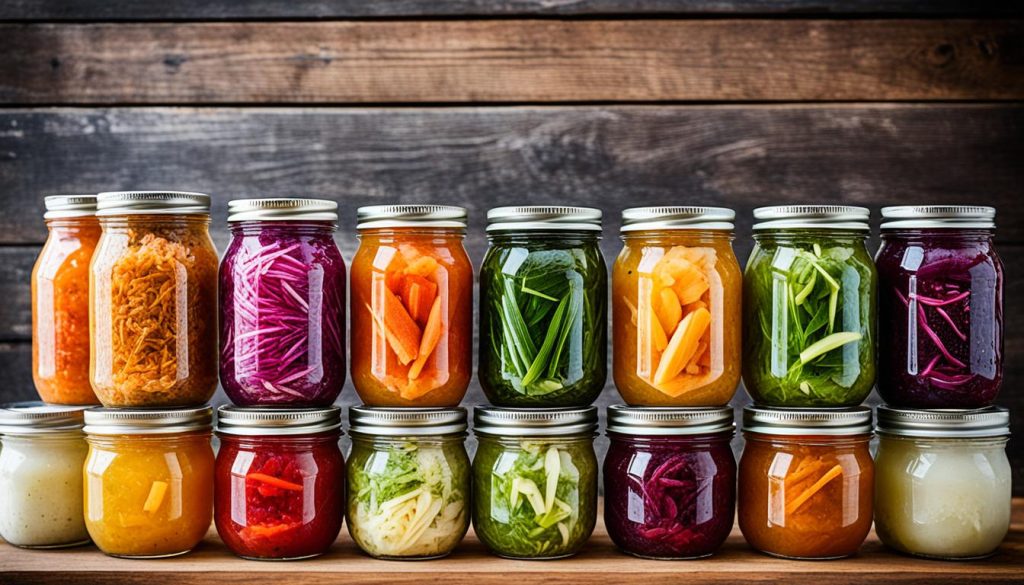Did you know that fermentation has been used for thousands of years to preserve and enhance the flavor of food? It’s a fascinating process that harnesses the power of microorganisms to transform carbohydrates into alcohol or acids, resulting in delicious and nutritious fermented foods.
From sauerkraut and yogurt to kombucha and kimchi, fermented foods have gained popularity not only for their unique taste but also for their health benefits. The probiotics produced during fermentation have been linked to improved digestion, a stronger immune system, and even weight loss.
In this article, we’ll explore the basics of fermentation and delve into the wide range of health benefits it offers. We’ll also discuss the various types of commonly fermented foods and how to incorporate them into your diet. Get ready to discover the tangy and transformative world of fermentation!
Key Takeaways:
- Fermentation is a natural process that uses microorganisms to convert carbohydrates into alcohol or acids.
- Fermented foods are rich in probiotics, which can improve digestion, boost the immune system, and support weight loss.
- Commonly fermented foods include sauerkraut, yogurt, kombucha, and kimchi.
- Incorporating fermented foods into your diet can enhance flavor, promote food preservation, and contribute to overall well-being.
What Is Food Fermentation?
Food fermentation is a natural process that involves the breakdown of carbs by microorganisms like yeast and bacteria. During fermentation, these microorganisms convert carbs into alcohol or acids, which act as a natural preservative. This fermentation process not only enhances the flavor and texture of food but also contributes to its longer shelf life.
Fermentation occurs when microorganisms break down sugars and starches found in food, such as fruits, vegetables, and grains. These microorganisms consume the carbs and produce byproducts like alcohol or lactic acid. This breakdown not only changes the taste and texture of the food but also creates an environment that inhibits the growth of harmful bacteria, serving as a natural preservation method.
Through the fermentation process, microorganisms like yeast and bacteria play a crucial role in transforming food. These microorganisms are naturally present in the environment or can be added intentionally by using starter cultures. They consume the sugars available in the food and convert them into alcohol, lactic acid, or other organic compounds. This chemical transformation not only enhances the flavor and aroma of the food but also provides additional health benefits.
One of the significant benefits of food fermentation is the production of probiotics. Probiotics are live microorganisms that confer health benefits when consumed. Fermented foods are rich in probiotics, which contribute to improved immune function, better digestion, and enhanced gut health. Consuming fermented foods regularly can help maintain a healthy balance of microorganisms in the gut and support overall well-being.
Fermentation also improves the digestibility and nutrient availability of foods. The breakdown of complex carbohydrates during fermentation makes them more easily digestible, allowing the body to absorb essential nutrients more efficiently. Additionally, fermentation reduces the levels of anti-nutrients present in certain foods, making them healthier and more beneficial for consumption.
Furthermore, the fermentation process can lead to the production of compounds with antioxidant properties that may contribute to overall health. These compounds help neutralize harmful free radicals in the body, reducing the risk of chronic diseases and promoting longevity.
In conclusion, food fermentation is a natural and ancient process that involves the breakdown of carbs by microorganisms, resulting in the production of alcohol, acids, and probiotics. This process not only enhances the flavor and texture of food but also acts as a natural preservative. Incorporating fermented foods into your diet can provide numerous health benefits, including improved digestion, enhanced immune function, and better overall well-being.
Health Benefits of Fermented Foods
Fermented foods offer numerous health benefits that contribute to overall well-being. Incorporating these foods into your diet can have positive effects on various aspects of your health.
Digestive Health
Fermented foods can significantly improve digestive health. The probiotics present in these foods promote the growth of beneficial gut bacteria, which aid in digestion and alleviate symptoms of digestive disorders like irritable bowel syndrome (IBS).
Boosted Immune System
Consuming fermented foods can boost your immune system by increasing the population of beneficial bacteria in your gut. These bacteria enhance the function of your immune system, making it more effective at fighting off harmful pathogens and reducing the risk of infections.
Better Nutrient Absorption
Regular consumption of fermented foods can enhance nutrient absorption in your body. The fermentation process breaks down complex nutrients, making them easier for your body to absorb and utilize. This can improve overall nutrient status and support optimal health.
Positive Effects on Mental Health
Research suggests that there is a strong connection between gut health and mental health. The probiotics found in fermented foods may have a positive impact on mental health by improving the gut-brain axis. This can help alleviate symptoms of anxiety and depression and improve overall mood.
Weight Loss
Some studies have indicated that incorporating fermented foods into your diet may aid in weight loss. The probiotics in these foods can contribute to a healthy gut microbiome, which is associated with weight management and reduced body fat percentage.
Heart Health
Fermented foods may also promote heart health. The consumption of fermented foods has been linked to a reduction in LDL cholesterol levels and improved heart function. This can lower the risk of cardiovascular diseases and contribute to a healthy heart.
Want to learn more about the health benefits of fermented foods?
References
- “Probiotics and Their Health Benefits.” Harvard Health Publishing, Harvard Medical School.
- “The gut microbiota and mental health: implications for anxiety- and trauma-related disorders.” NCBI.
- “Fermented Foods and Their Beneficial Effects on Human Health: A Review.” NCBI.
- “Fermented foods for better gut health.” Mayo Clinic.
Safety and Side Effects
While fermented foods are generally safe for most people, it is important to be aware of potential side effects and take necessary precautions to ensure food safety. Some individuals may experience side effects such as gas and bloating due to the high probiotics content in fermented foods. These side effects are usually mild and temporary, but if they persist or worsen, it is advisable to consult a healthcare professional.
When consuming store-bought fermented products, it is crucial to read nutrition labels carefully. This will help you understand the probiotics content and other nutritional information of the product. Look for products that are low in added sugars and preservatives, and high in beneficial bacteria.
For those interested in home fermentation, following recipes closely and adhering to safety guidelines is essential. Proper hygiene practices, such as sterilizing equipment and using clean ingredients, help prevent the growth of harmful bacteria and ensure a safe fermentation process. It is also important to maintain the right temperature and fermentation time specified in the recipe to avoid spoilage.
Common Fermented Foods
Fermented foods are a staple in many cultures around the world, offering not only unique flavors but also numerous health benefits. Here are some common examples of fermented foods:
Kefir
Kefir is a tangy, probiotic-rich drink that is made by fermenting milk with kefir grains. It has a slightly carbonated texture and is known for its gut-friendly bacteria.
Sauerkraut
Sauerkraut is a traditional German dish made from fermented cabbage. It has a distinctive sour taste and is packed with beneficial probiotics, vitamins, and minerals.
Tempeh
Tempeh is a popular plant-based protein made from fermented soybeans. It has a nutty flavor and a firm texture, making it a versatile ingredient in various recipes.
Yogurt
Yogurt is a creamy, tangy dairy product made by fermenting milk with live cultures. It is an excellent source of probiotics and is often enjoyed as a snack or used as a base for dips and sauces.
Kombucha
Kombucha is a fizzy, fermented tea drink that is made by fermenting sweetened black or green tea with a SCOBY (symbiotic culture of bacteria and yeast). It is known for its refreshing taste and digestive benefits.
Sourdough Bread
Sourdough bread is made using a natural fermentation process that involves using a sourdough starter, which is a mixture of flour and water that has been fermented by wild yeasts and lactic acid bacteria. This fermentation process gives the bread its tangy flavor and unique texture.
Each of these fermented foods undergoes different fermentation techniques, resulting in their unique flavors, textures, and health benefits. Incorporating these foods into your diet can add variety and promote a healthy gut microbiome.
Conclusion
Fermentation is an ancient technique that not only serves as a method of food preservation but also offers numerous health benefits. By incorporating fermented foods into your diet, you can improve your digestion, boost your immune system, and enjoy enhanced flavor development. The probiotics found in fermented foods contribute to better gut health, supporting overall well-being.
Among the many fermented foods available, sauerkraut, yogurt, and kombucha are popular choices that can add a tangy zest to your meals. Fermentation basics play a significant role in unlocking the health benefits and unique flavors that these foods offer. It’s important to note that the probiotics found in fermented foods are live microorganisms that have been linked to improved digestive health and a stronger immune system.
Whether you’re looking to improve your gut health, explore new flavors, or preserve food naturally, fermentation provides a versatile and flavorful solution. So why not introduce some fermented foods into your diet and experience the multitude of benefits they have to offer? Start your fermentation journey today and discover a whole new world of culinary adventures!


